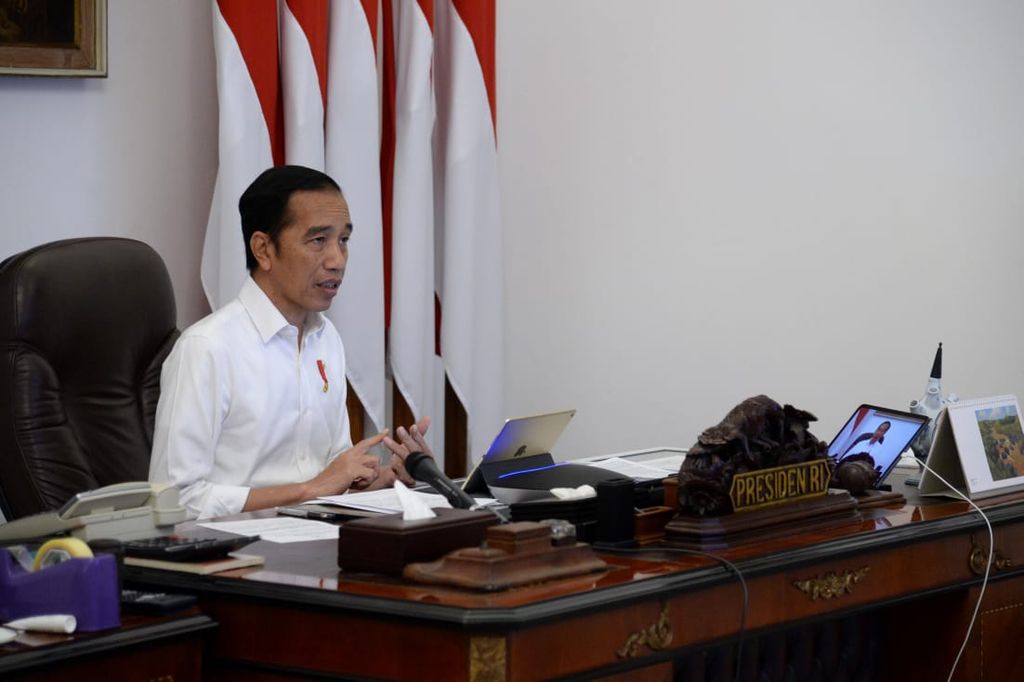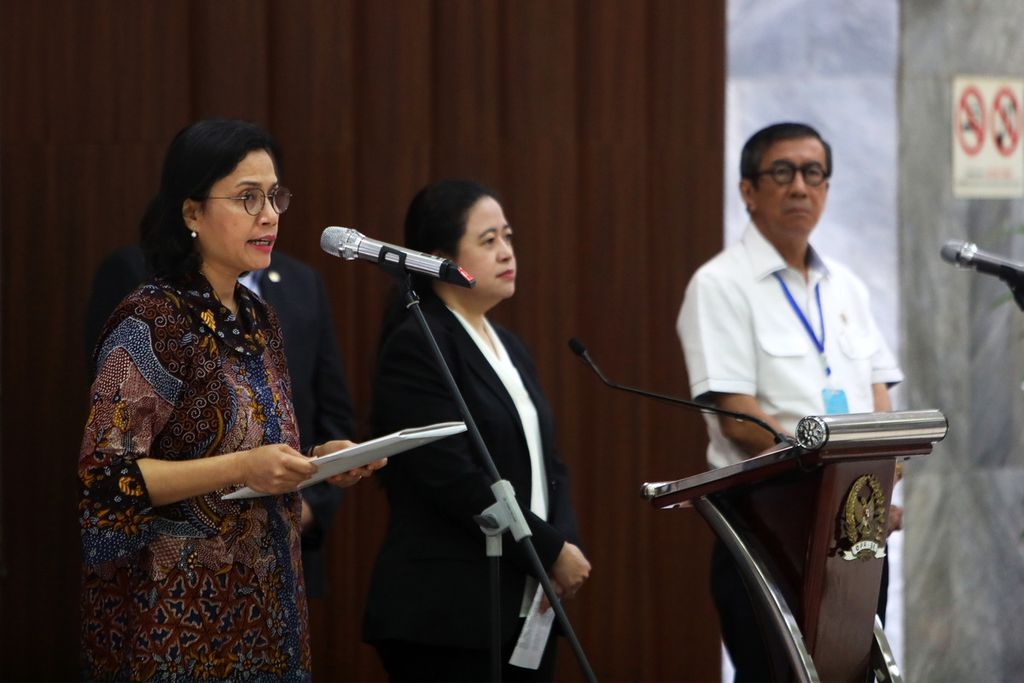Covid-19 Emergency Budget
There needs to be a balance between managing health quickly and saving people\'s livelihoods.

President Joko Widodo chaired a limited cabinet meeting related to the development of the handling of Covid-19 through a teleconference from the Merdeka Palace, Jakarta, Monday (4/13/2020).
“I assure you that we know what to do to bring our economy back to life. What we do not know is how to bring people back to life.” The statement from Ghana President Nana Akufo-Addo went viral and has garnered much praise from netizens.
The statement is deemed as representing the aspirations of world citizens with regard to how policymakers should act in the war against the COVID-19 pandemic. There needs to be a balance between managing health quickly and saving people\'s livelihoods. This was also emphasized in a joint statement between the World Health Organization (WHO) and the International Monetary Fund (IMF) on 3 April. "
“Economic measures should come in addition to -- not as a substitute for -- health spending."
A year before the COVID-19 pandemic, the International Budget Partnership (2019), a nonprofit organization, that focuses on public finance, stressed the need for a change of perspective in public finance that increasingly moves toward justice and human rights. This is caused by the fact that countries are prioritizing fiscal discipline by keeping deficits and inflation low, and focusing on growth with low taxes to encourage private investment.
Also read: Coordinate the Handling of Covid-19
The presence of the state in the frontline during an emergency cannot be negotiated. In times of crisis, the market or the private sector also relies on the central role of the government. Now we watch how countries all over the world pour trillions of US dollars in the war against Covid-19. Borrowing the term of Philip Stephens in the Financial Times (07/04/2020), this is an era which marks the collapse of a fundamentalist fiscal regime. Therefore, it is appropriate to examine countries\' responses to Covid-19 handling from the perspective of determined fiscal instruments.

Finance Minister Sri Mulyani Indrawati (left) together with Chairman of the House of Representatives Puan Maharani (center), Minister of Justice and Human Rights Yasonna Laoly delivered a statement to reporters at the Parliament Building Complex, Senayan, Jakarta, on Thursday (2/4/2020). Sri Mulyani together with Yasonna Laoly representing the President delivered a Presidential Letter related to the submission of legal rules regarding additional government budget for handling the Covid-19 pandemic to the DPR.
Portrait of the Covid-19 budget
In the Indonesian context, at least this emergency measure has been manifested by the issuance of Government Regulations in lieu of Law (Perppu) of State Finance and Financial System. Through the Presidential Regulation (Perpres) of the Amendment to the State Budget (APBN), a budget of Rp 405 trillion or 2.5 percent of gross domestic product (GDP) is poured out to fight the Covid-19 outbreak.
The maximum deficit limit of 3 percent of GDP, which has been a tight rule on the fundamentalist fiscal regime, has been pushed up to 5.07 percent of GDP this year. The courage to take the fiscal political emergency option needs to be tested in terms of the utilization and change of the budget posture itself.
First, the widening of the budget deficit which is followed by additional debt of Rp 654.5 trillion, or almost doubled, is used in a larger part to cover up the collapse of state revenues, compared to the additional Covid-19 emergency expenditure fund, outside the economic recovery reserve fund. The reason is, state expenditure has only increased by Rp 73.3 trillion, while revenues have decreased by up to Rp 472 trillion.
Also read: Indonesia Unite, in Coronavirus Threat
We can understand the decline in state revenues due to changes in macroeconomic assumptions, such as the falling oil prices and the economic slowdown. However, the problem is that the reduced income is also triggered by a decrease in the corporate income tax (PPh) rate set in the Perppu on State Finance and the Financial System to 22 percent in 2020, 20 percent in 2022, and 17 percent for domestic taxpayers listed on the stock exchange.

The reduction in corporate tax rates is exactly the same as the editorial of the tax omnibus law proposed by the government. This gives the impression that there is an effort to take advantage of a crisis situation to accelerate the reduction in tax rates. The question is how important is the rate reduction in the midst of an emergency situation?
Second, outside of financing for economic recovery, the main source of additional budget comes from the reallocation of ministry/agency spending, regional transfers, and reallocation of reserves. It turns out that the seriousness of the ministries/agencies in their action in connection with this emergency situation has not yet been apparent.
From the writer\'s search, only 15 ministries/institutions seriously cut the budget by above 20 percent, while the majority of 45 ministries/institutions cut the budget by less than 10 percent. In fact, official travel expenditures, meeting costs, and organizing events involving many people can certainly not be done this year.
Third, in terms of the distribution of Covid-19 emergency budget, the biggest utilization is intended for industrial support and economic recovery, which reaches 55 percent of the additional budget. In fact, the effectiveness of government efforts to control health problems will determine the amount of costs used in economic recovery. The most important economic policy at this time is to reduce the risk of socioeconomic pressure at the household level.
The less effort related to handling the health problems, the harder the economic recovery effort will be. There must be in the minds of the policymakers a thinking that an addition and composition of the budget is very dynamic and allows occurrence of an addition or other shifting in the budget in responding quickly to the development of Covid-19.
Emergency budget transparency and accountability
Apart from the above fiscal political choices, the additional budget plays an important role in supporting the government\'s response to addressing Covid-19 health problems and their derivatives. Of course we support the government\'s rapid steps in arranging the priorities and reallocating the budget to deal with Covid-19.
In an emergency situation, the speed of budget disbursement, flexibility and accountability must go hand in hand and cannot be interchanged.
The speed of disbursement of the budget and the flexibility of using the budget are the determining factors in responding to an emergency situation. However, keep in mind, corruption and inefficiency will even get worse in this crisis. The government must be more closely monitored in the implementation of the budget. In an emergency situation, the speed of budget disbursement, flexibility and accountability must go hand in hand and cannot be interchanged.
It should be underlined that budget transparency is not a luxury in times of such an emergency situation, even more important than normal situation. In addition to minimizing irregularities, fiscal transparency is needed to track the design of the plan and the steps being taken, including seeing its progress and what is exchanged. Identifying the sustainability and fiscal risk, as well as increasing the efficiency and effectiveness of budget execution, is also a manifestation of fiscal transparency in times of crisis.
Also read: Government Prepares New SSN Programs
The government also needs to create a new or separate budget line, with the Finance Ministry taking the leading role in financial accountability even though budget execution is carried out in many sectors (Barroy et al, 2020). Based on the Perpres of the Amendment to the 2020 State Budget Posture, additional spending for the central government for handling Covid-19 is centered on the Budget Section of the State General Treasurer (BA BUN) or known as BA 999. It should be underlined, the Covid-19 handling budget is also carried out by other ministries/agencies, the regional governments, even village governments.
With a separate budget line, the government decision-making process based on the progress of budget execution can be accounted for and assessed for its effectiveness.
For the sake of effective control, tracking the use of budgets and consolidating the financial reporting, the existence of special account codes is not negotiable. With a separate budget line, the government decision-making process based on the progress of budget execution can be accounted for and assessed for its effectiveness. No one can predict when Covid-19 emergency situation will end. It is clear that budget transparency and accountability alone will not be able to overcome this condition. However, these two components are glue in capitalizing the support of citizens to support the government\'s efforts to face a common enemy, namely the coronavirus pandemic.
Yuna Farhan, Country manager Indonesia, International Budget Partnership